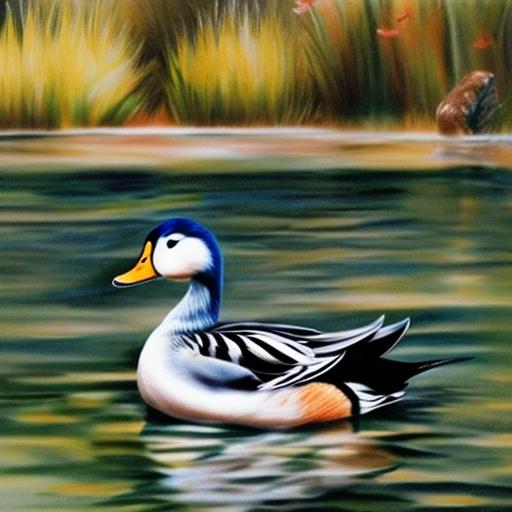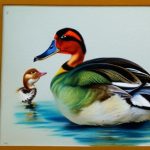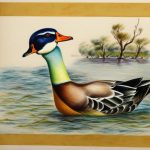Ducks come in a wide variety of breeds, each with its own unique characteristics and traits. Some of the most popular duck breeds include the Pekin, Mallard, Rouen, Khaki Campbell, and Muscovy. The Pekin duck is known for its white feathers and orange bill, and is one of the most common breeds raised for meat production. The Mallard, on the other hand, is a wild breed that is often kept as a pet due to its beautiful iridescent green head and striking coloration. The Rouen is a domestic breed that closely resembles the Mallard in appearance, but is larger and heavier. The Khaki Campbell is a popular egg-laying breed, known for its high productivity and calm temperament. Lastly, the Muscovy duck is a unique breed with distinct red facial caruncles and a quiet, friendly disposition.
Each duck breed has its own specific needs and requirements, so it’s important to research and understand the characteristics of each breed before deciding which one is right for you. Factors to consider include size, temperament, egg-laying capabilities, and overall suitability for your lifestyle and living situation. By understanding the differences between duck breeds, you can make an informed decision about which breed will best fit into your home and meet your needs.
Key Takeaways
- There are many different duck breeds, each with unique characteristics and traits.
- Consider your lifestyle and space availability when choosing the right duck breed for you.
- Ducks require proper housing, including shelter and access to water, to thrive as pets.
- Duck breeds have specific dietary needs and require a balanced diet for optimal health.
- Regular health check-ups and proper veterinary care are essential for the well-being of duck breeds as pets.
Choosing the Right Duck Breed for Your Lifestyle
When choosing a duck breed, it’s important to consider your lifestyle and the purpose for which you want to keep ducks. If you’re looking for a breed that will provide you with a steady supply of eggs, then the Khaki Campbell or Indian Runner may be the best choice for you. These breeds are known for their prolific egg-laying abilities and can provide you with a consistent source of fresh eggs. On the other hand, if you’re interested in raising ducks for meat production, then the Pekin or Muscovy may be more suitable options due to their large size and fast growth rate.
If you’re primarily interested in keeping ducks as pets, then the temperament and behavior of the breed will be important factors to consider. Some breeds, such as the Pekin and Rouen, are known for their calm and friendly disposition, making them great choices for families with children or first-time duck owners. On the other hand, breeds like the Mallard and Muscovy may be better suited for experienced duck keepers who are looking for a more independent and wilder nature in their ducks. By carefully considering your lifestyle and preferences, you can choose a duck breed that will be well-suited to your needs and provide you with enjoyment and fulfillment.
Caring for Duck Breeds as Pets
Caring for duck breeds as pets requires attention to their specific needs in terms of housing, feeding, and socialization. Ducks are social animals that thrive in the company of others, so it’s important to keep them in pairs or small groups to prevent loneliness and boredom. Providing them with a spacious and secure enclosure is essential to ensure their safety and well-being. Ducks also need access to water for swimming and bathing, as well as regular grooming to maintain their feathers and keep them clean.
Feeding ducks a balanced diet that includes a mix of commercial duck feed, fresh vegetables, and access to foraging opportunities is crucial for their health and vitality. It’s important to monitor their food intake and ensure they have access to clean water at all times. Additionally, providing them with enrichment activities such as foraging toys and puzzles can help keep them mentally stimulated and prevent boredom.
Regular veterinary care is also essential to ensure the health and longevity of your pet ducks. This includes routine check-ups, vaccinations, and prompt treatment of any illnesses or injuries. By providing proper care and attention to their needs, you can ensure that your pet ducks lead happy and healthy lives as part of your family.
Housing and Enclosure Requirements for Duck Breeds
Ducks require a secure and spacious enclosure that provides protection from predators and the elements. The enclosure should include a sheltered area for resting and nesting, as well as access to a clean water source for swimming and bathing. It’s important to provide ample space for ducks to move around freely and engage in natural behaviors such as foraging and socializing.
The enclosure should be constructed with sturdy fencing to prevent escapes and keep out predators such as foxes, raccoons, and birds of prey. Additionally, it’s important to provide adequate ventilation and insulation to maintain a comfortable temperature inside the enclosure throughout the year. Regular cleaning and maintenance of the enclosure is also essential to prevent the buildup of waste and bacteria that can lead to health issues for the ducks.
In addition to a secure enclosure, ducks also benefit from access to an outdoor area where they can graze, forage, and explore. This outdoor space should be enclosed with fencing to prevent escapes and provide protection from predators. By providing a safe and comfortable housing environment for your ducks, you can ensure their well-being and happiness as part of your family.
Feeding and Nutrition for Duck Breeds
Feeding ducks a balanced diet that meets their nutritional needs is essential for their health and well-being. Ducks require a diet that includes a mix of commercial duck feed, fresh vegetables, grains, and access to foraging opportunities. It’s important to provide them with a high-quality commercial duck feed that is specifically formulated to meet their dietary requirements.
In addition to commercial feed, ducks can also benefit from access to fresh vegetables such as lettuce, spinach, peas, and carrots. These vegetables provide essential vitamins and minerals that contribute to their overall health and vitality. Ducks also enjoy foraging for insects, worms, and other small creatures, so providing them with opportunities to engage in natural foraging behaviors can help keep them mentally stimulated and satisfied.
It’s important to monitor their food intake and ensure they have access to clean water at all times. Ducks require plenty of water for drinking, swimming, and bathing, so it’s important to provide them with a clean water source that is regularly replenished. By providing a balanced diet that meets their nutritional needs, you can ensure that your ducks remain healthy and happy as part of your family.
Health and Veterinary Care for Duck Breeds

Regular veterinary care is essential to ensure the health and well-being of your pet ducks. This includes routine check-ups, vaccinations, parasite control, and prompt treatment of any illnesses or injuries. It’s important to find a veterinarian who has experience working with ducks and can provide expert care tailored to their specific needs.
Common health issues that can affect ducks include respiratory infections, parasites, bumblefoot, and injuries from predators or accidents. It’s important to monitor your ducks closely for any signs of illness or injury, such as changes in behavior, appetite, or appearance. Prompt veterinary care is crucial to diagnose and treat any health issues before they escalate into more serious problems.
In addition to regular veterinary care, providing a clean living environment, balanced diet, and opportunities for exercise can help prevent many common health issues in ducks. By being proactive about their health care needs and providing them with proper care and attention, you can ensure that your pet ducks lead long and healthy lives as part of your family.
Training and Socialization for Duck Breeds as Pets
Training and socialization are important aspects of caring for duck breeds as pets. Ducks are intelligent animals that can be trained to respond to commands, interact with humans, and engage in positive behaviors. Positive reinforcement training methods such as using treats, praise, and patience can help build trust and strengthen the bond between you and your pet ducks.
Socialization is also crucial for ducks to develop positive relationships with humans and other animals. Spending time with your ducks on a daily basis, talking to them, offering treats, and engaging in gentle handling can help them become more comfortable around people. It’s important to introduce them to new experiences gradually and in a positive manner to prevent fear or anxiety.
Providing enrichment activities such as toys, puzzles, and opportunities for outdoor exploration can also help keep ducks mentally stimulated and prevent boredom. Ducks enjoy engaging in natural behaviors such as foraging, swimming, and socializing with other ducks, so providing them with opportunities to engage in these activities can help keep them happy and fulfilled.
By investing time and effort into training and socializing your pet ducks, you can build a strong bond with them and ensure that they are well-adjusted members of your family. With patience, consistency, and positive reinforcement, you can help your pet ducks develop into well-behaved and happy companions.
If you’re considering raising ducks as pets, you might also be interested in learning about the natural hatching process of chicken eggs. Understanding how long it takes for chicken eggs to hatch naturally can provide valuable insights into the breeding and care of poultry. Check out this informative article on PoultryWizard to gain a deeper understanding of this fascinating aspect of poultry farming.
FAQs
What are some popular duck breeds kept as pets?
Some popular duck breeds kept as pets include the Pekin, Mallard, Khaki Campbell, Rouen, and Call ducks.
What are the characteristics of Pekin ducks as pets?
Pekin ducks are known for their friendly and docile nature, making them great pets. They are also good egg layers and have a white plumage.
What are the characteristics of Mallard ducks as pets?
Mallard ducks are known for their beautiful and colorful plumage. They are also hardy and adaptable, making them suitable for pet owners with outdoor space.
What are the characteristics of Khaki Campbell ducks as pets?
Khaki Campbell ducks are known for their excellent egg-laying abilities, making them popular among pet owners who want a source of fresh eggs.
What are the characteristics of Rouen ducks as pets?
Rouen ducks are known for their calm and gentle nature, making them good pets for families. They also have a striking plumage that adds to their appeal.
What are the characteristics of Call ducks as pets?
Call ducks are known for their small size and distinctive “quack” sound. They are often kept as ornamental pets due to their cute appearance and friendly demeanor.
Meet Walter, the feathered-friend fanatic of Florida! Nestled in the sunshine state, Walter struts through life with his feathered companions, clucking his way to happiness. With a coop that’s fancier than a five-star hotel, he’s the Don Juan of the chicken world. When he’s not teaching his hens to do the cha-cha, you’ll find him in a heated debate with his prized rooster, Sir Clucks-a-Lot. Walter’s poultry passion is no yolk; he’s the sunny-side-up guy you never knew you needed in your flock of friends!







